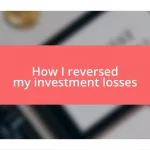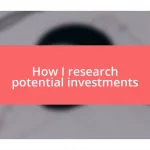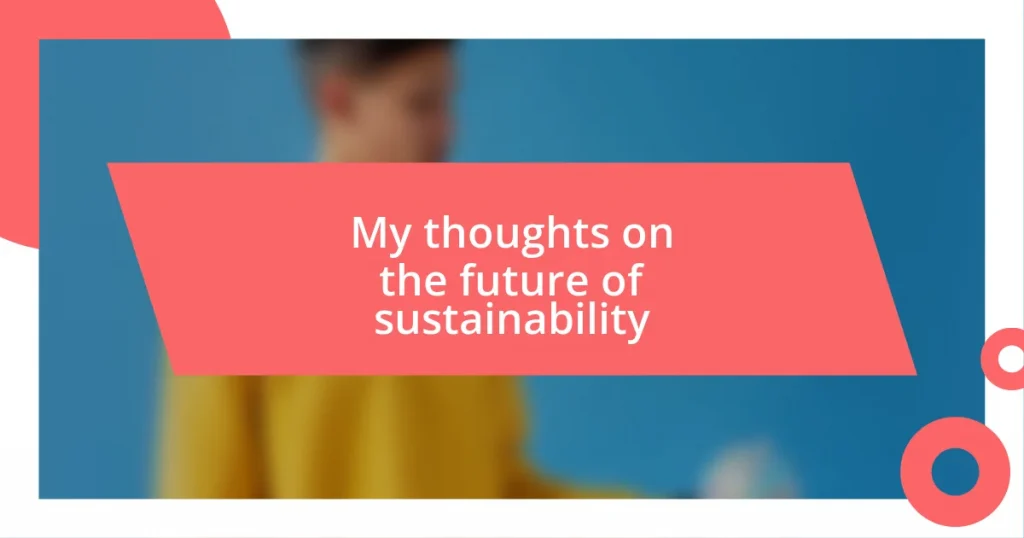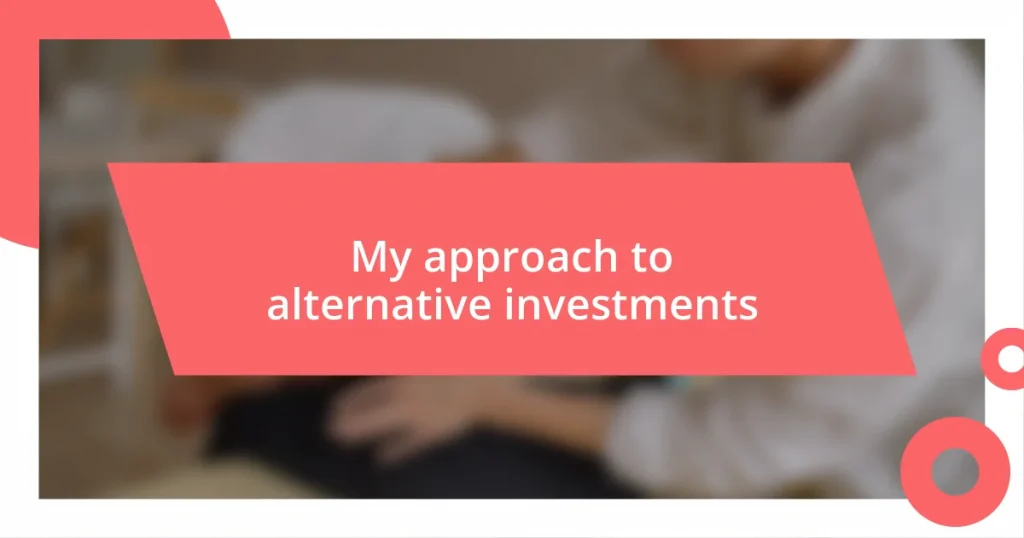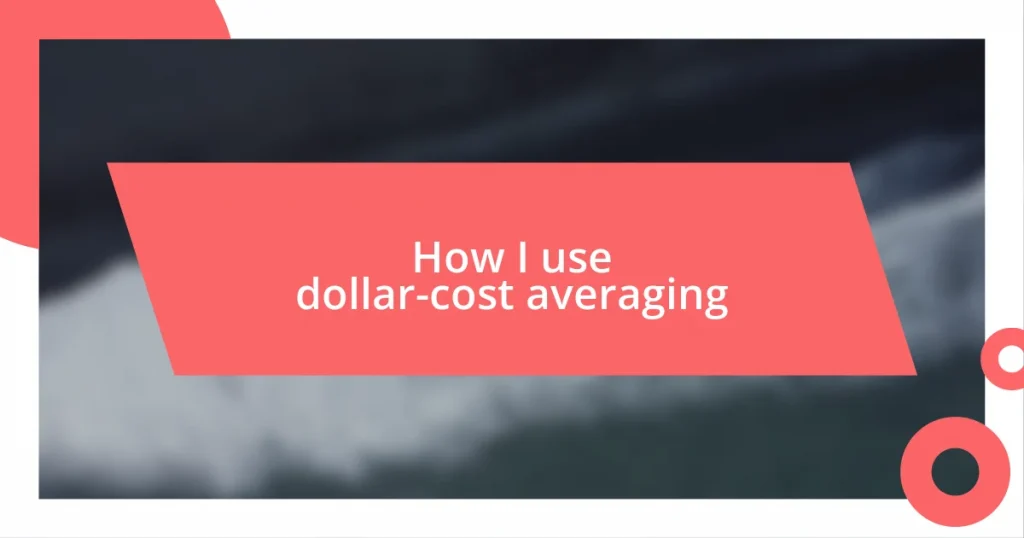Key takeaways:
- Sustainability encompasses environmental health, social equity, and economic vitality, emphasizing the importance of community engagement in creating effective solutions.
- Current trends include renewable energy adoption, vertical farming, circular economy practices, eco-friendly packaging, and sustainable fashion, reflecting a collective mindset shift towards sustainability.
- Personal actions such as reducing single-use plastics, meal planning, and advocating for sustainable practices at work play a crucial role in promoting sustainability at an individual level.
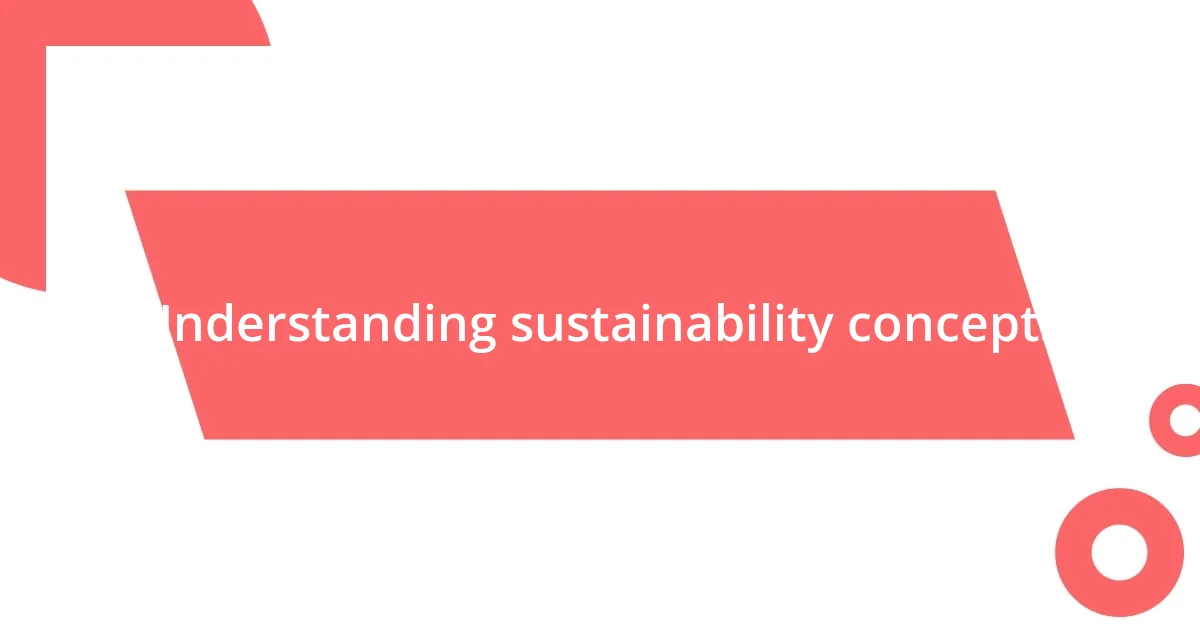
Understanding sustainability concepts
Sustainability is often viewed as a buzzword, but at its core, it’s about finding balance. I remember my first experience with sustainable living when I noticed the stark difference in waste between my home and a friend’s zero-waste lifestyle. It made me question what I could recycle or repurpose, prompting a deeper dive into the essence of sustainable practices and their necessity for our planet.
One key concept of sustainability is the intersection between environmental health, social equity, and economic vitality—often referred to as the “triple bottom line.” I once attended a workshop where a speaker emphasized the importance of community engagement in sustainability efforts. It hit me then: how can we truly move forward without involving those we aim to serve? This integration of diverse perspectives not only creates more comprehensive solutions but also fosters a sense of ownership within communities.
Moreover, I’ve noticed that the concept of sustainability extends beyond just environmental concerns; it also encompasses ethical consumption. It made me reflect on my purchasing decisions as I learned how my choices impact both the globe and local economies. This realization is crucial—what if each of us began to make more conscious choices about what we consume? It’s a journey that requires reflection, but the outcomes can be immensely rewarding, both personally and globally.
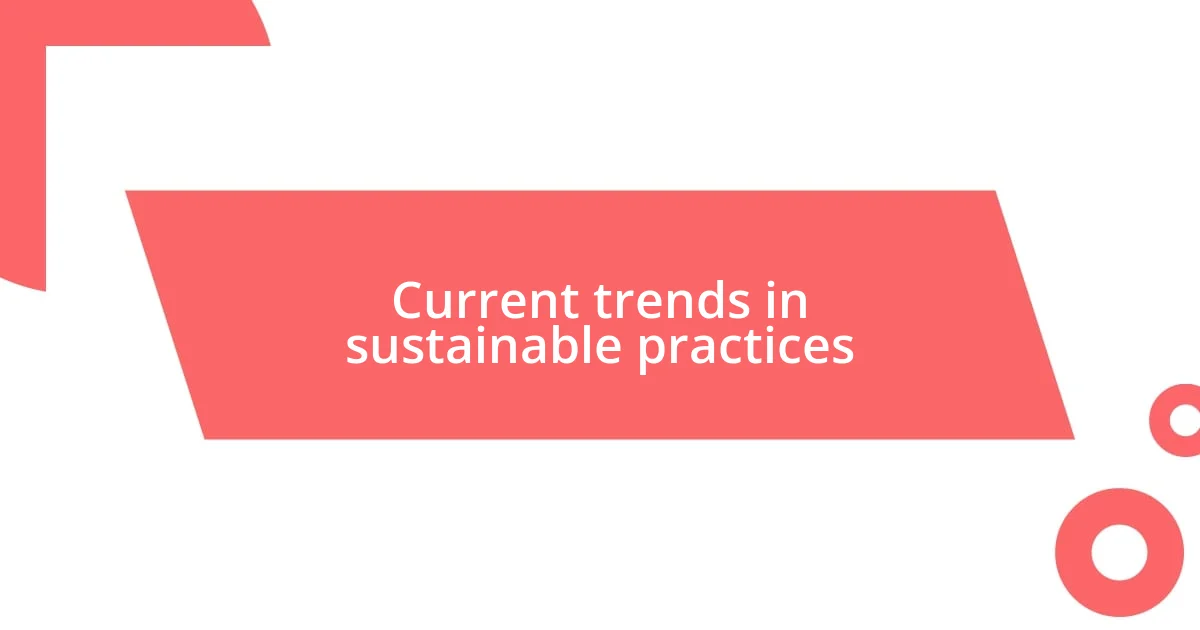
Current trends in sustainable practices
As I delve into the current trends in sustainable practices, I must highlight the growing adoption of renewable energy sources. These days, I find myself more frequently discussing solar panels and wind turbines with friends and neighbors, and the excitement in their voices is palpable. People are becoming increasingly aware of the carbon footprint of traditional energy sources, leading to a surge in residential solar installations. I remember chatting with a coworker who completely transformed his home energy system—it inspired me to look into my own options.
Here are some notable trends I’ve observed:
- Increased investment in vertical farming: Utilizing urban spaces for food production is gaining momentum, which I think is a clever way to address food security while minimizing transportation emissions.
- Circular economy practices: Companies are now striving to create closed-loop systems, like upcycling materials to reduce waste.
- Eco-friendly packaging: I’ve noticed that brands are shifting away from plastic in favor of biodegradable options, a change that resonates deeply with my own commitment to reducing plastic use.
- Sustainable fashion: With second-hand shopping on the rise, I find joy in sharing thrift shop finds with friends—it’s fulfilling to know we’re giving clothes a second life.
It’s amazing to see how these trends reflect a collective shift in mindset. I’ve experienced a profound sense of motivation just by being part of conversations around these topics, realizing that small lifestyle choices can resonate far beyond my immediate environment.
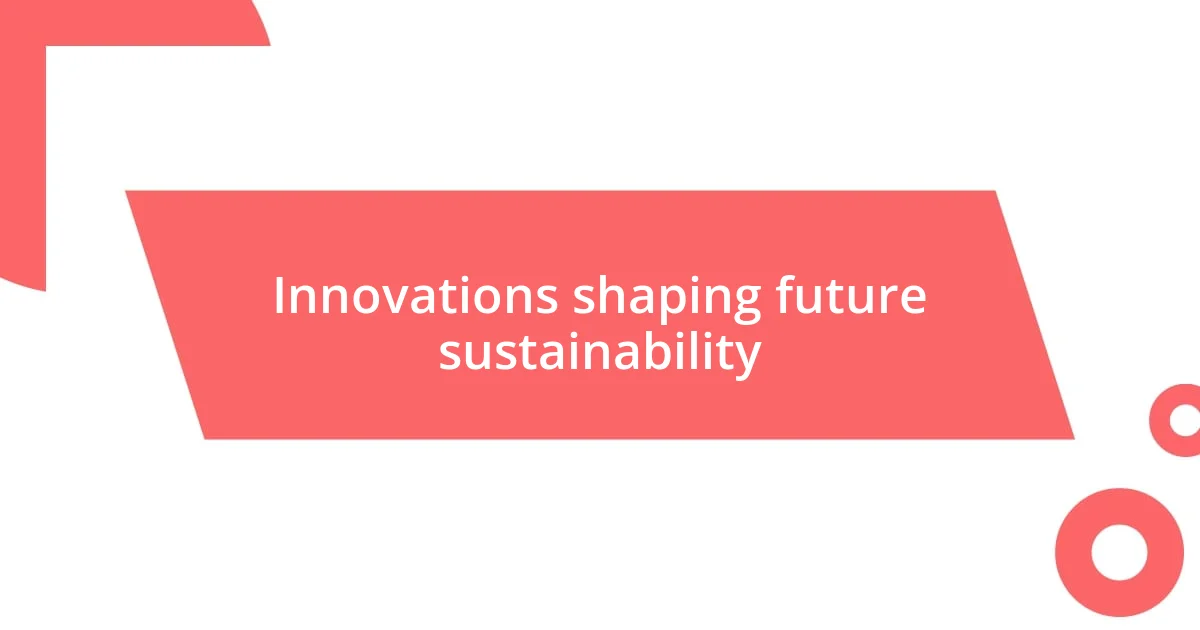
Innovations shaping future sustainability
Sustainable innovations are reshaping our future, and I can’t help but feel excited about the technology that’s being developed today. For instance, the rise of smart grids and energy management systems is fascinating. These systems allow consumers to monitor and optimize their energy use, especially during peak hours. I remember chatting with a friend who installed a smart thermostat; he raved about how it not only lowered his energy bills but also made him feel more in control of his consumption. It’s this kind of awareness that can catalyze wider change.
Another significant innovation I’m passionate about is biodegradable alternatives to common plastics. When I stumbled upon a brand that creates packaging from seaweed and corn, I was genuinely impressed. It made me consider how my simple act of tearing open a package could contribute to a future free of landfill waste. If more companies adopted such materials, think about the environmental impact we could collectively achieve!
Finally, the integration of AI into agriculture is something I find particularly noteworthy. Automated precision farming technologies are indeed revolutionizing food production while minimizing resource use. When I learned about how drones can assess crop health and optimize water usage, it felt like a glimpse into the future—a future where we can grow food sustainably without compromising our planet’s health. What if every farm adopted such technology? The potential benefits are immense!
| Innovation | Impact on Sustainability |
|---|---|
| Smart Grids | Optimize energy consumption, reduce peak usage. |
| Biodegradable Packaging | Decreases landfill waste, eco-friendly alternatives. |
| AI in Agriculture | Enhances crop management, uses resources efficiently. |
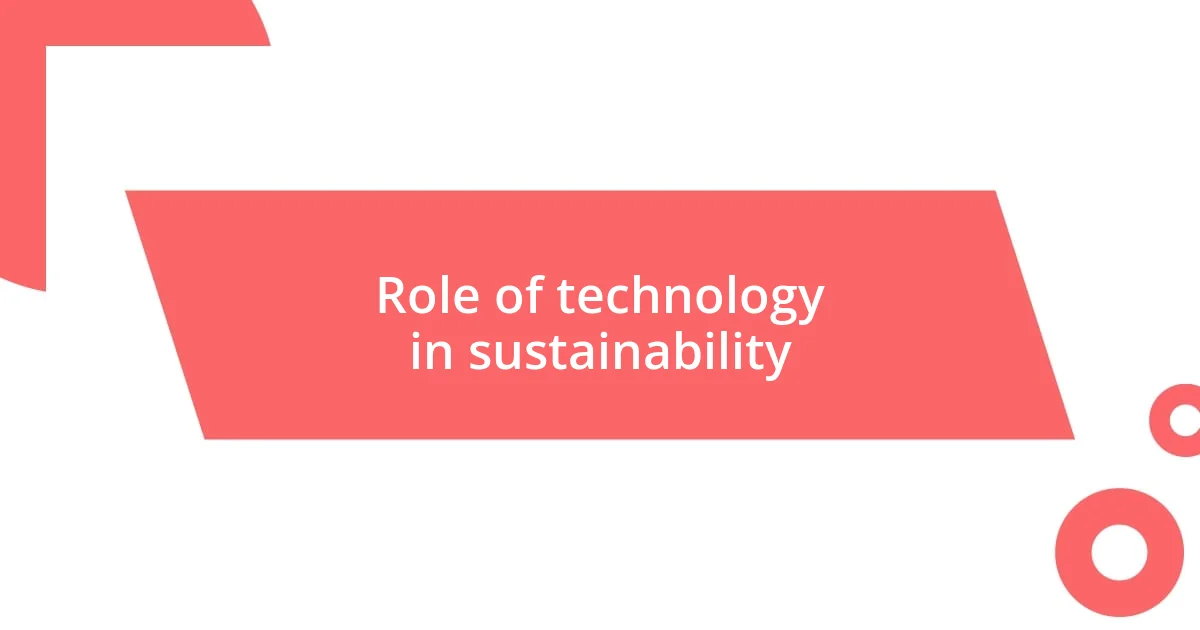
Role of technology in sustainability
Technology is playing an increasingly pivotal role in advancing sustainability, and I find it absolutely fascinating. Take carbon capture and storage, for example. I recently read about a startup successfully extracting CO2 from the atmosphere and storing it underground. It made me wonder: could this be a game-changer for industries struggling to reduce emissions? I believe it highlights our potential to innovate solutions for climate challenges.
The rise of electric vehicles (EVs) also excites me, as they represent a shift towards cleaner transportation. One of my friends transitioned to an EV last year, and every time I see her zip around town, I’m reminded of how these vehicles contribute to reducing urban air pollution. It’s inspiring to think of a future where EV charging stations are as common as gas stations, isn’t it? This shift could redefine urban landscapes and air quality for generations.
Moreover, the increasing integration of IoT (Internet of Things) in everyday devices truly intrigues me. Smart appliances now help us manage our energy use more efficiently. I recall hosting a dinner party recently and engaging my guests in a conversation about how my smart fridge alerts me before food expires. It’s a small example, but it sparked a thoughtful discussion about waste reduction. Couldn’t that level of awareness transform our relationship with consumption? I genuinely believe that with every technological advancement, we inch closer to a more sustainable future.
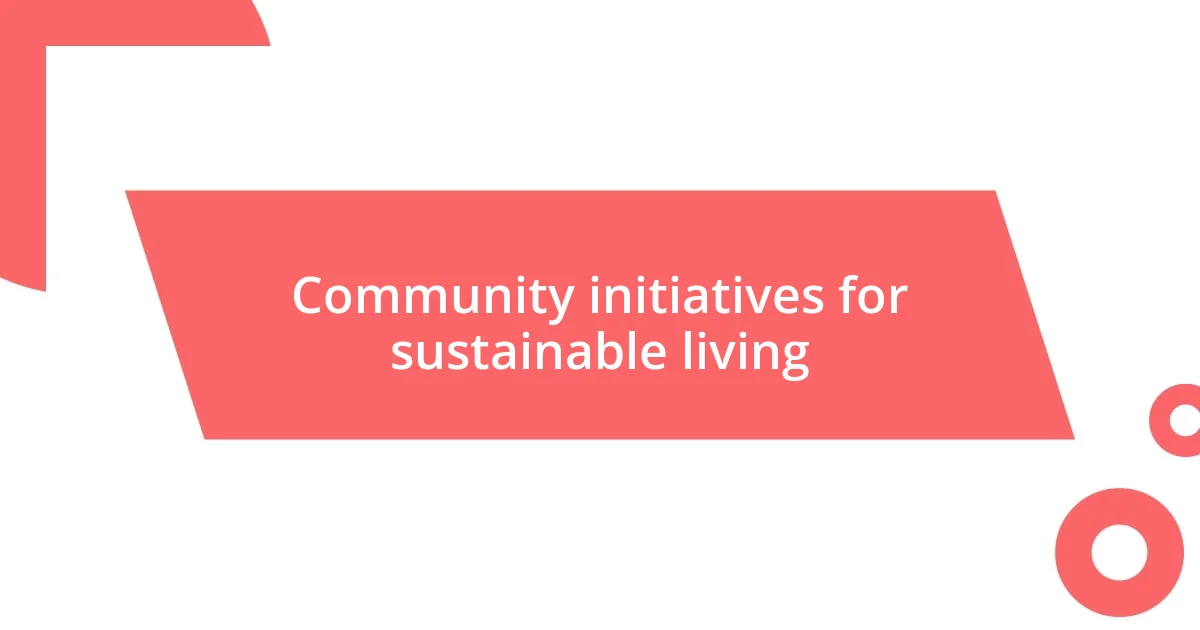
Community initiatives for sustainable living
Community initiatives play a crucial role in fostering sustainable living, and I’ve seen firsthand how they can bring people together for a common cause. For example, in my neighborhood, a community garden was established that not only provides fresh produce but also serves as a hub for education on sustainable practices. When I participated in one of their workshops, it was inspiring to see families actively learning about composting and organic gardening. Isn’t it amazing how sharing knowledge can empower a whole community?
Another initiative that stands out to me is local clean-up events, which often create a sense of camaraderie among participants. I remember joining a beach clean-up one sunny Saturday. The feeling of working alongside others, all unified in the shared goal of preserving our environment, created an uplifting atmosphere. The sheer joy of seeing our efforts transform the shoreline was a powerful reminder of how collective action has tangible results. Have you ever participated in anything similar? It fills you with hope, doesn’t it?
I’ve also been impressed with the rise of tool libraries, which promote resource sharing and reduce waste. In my city, a group set up a library where people can borrow tools instead of purchasing them—think lawnmowers, drills, and gardening equipment. I borrowed a chainsaw for a weekend project and was delighted not only to save money but also to know I was participating in a more sustainable model of consumption. It’s incredible how small changes in our habits can lead to a larger impact on our environment. Wouldn’t you agree that community-driven solutions like these offer exciting possibilities for more sustainable living?
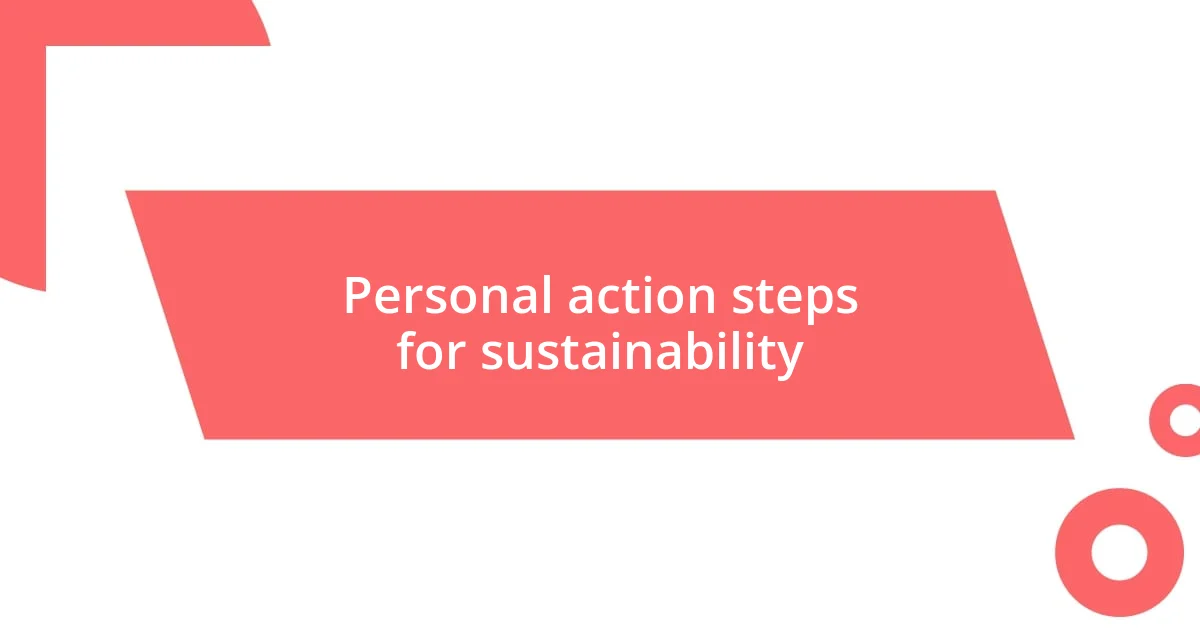
Personal action steps for sustainability
One of the most impactful personal actions I’ve taken for sustainability is reducing single-use plastics. I remember a moment when I was at a local market, and I saw a woman passionately refusing plastic bags. Inspired, I decided right then to bring my own reusable bags everywhere. It’s been a small change, but it fills me with a sense of responsibility each time I see those bags in my trunk, ready to use. Have you ever thought about how simple steps like this can accumulate into something significant?
Another action that I’ve found incredibly beneficial is meal planning and batch cooking. I started planning my meals for the week to minimize food waste, and it not only saves me time but reduces my impact on the environment. The other day, when I pulled a perfectly portioned vegetable stir-fry from my freezer, it felt like a small victory. The idea that I’m contributing to less food going to the landfill is empowering, don’t you think? It makes me wonder how much more could we all save if we put just a bit of extra thought into our food choices?
Lastly, advocating for sustainability in my workplace has become a personal mission for me. I remember proposing a paperless initiative to my team, and to my surprise, they were enthusiastic about it. We’ve since transitioned to digital documents and reduced our paper waste significantly. It’s not just about the numbers; it creates a shared sense of purpose. Collaborating with others on sustainable projects can truly make a difference. Do you feel motivated to champion similar causes within your own circles? It’s rewarding to realize that each voice can spark change.





